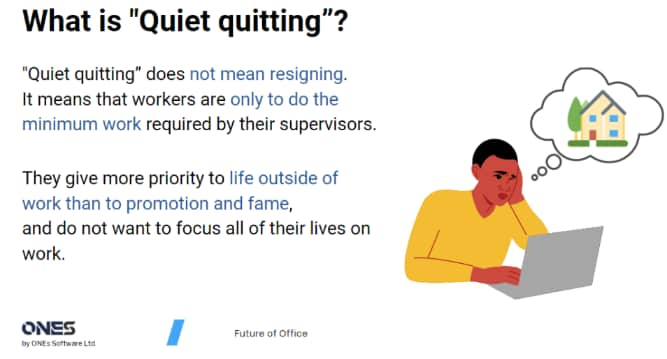Contents
Godness… We wish plazas could talk… They could say that there are loud resignations every day but they are not being talked about as much as “quiet quitting phenomenon“, right? It must be admitted that it is not a coincidence that such concepts, which may seem overly socialite or surreal to some, are popular among white-collar workers. It could be accepted as one of work placetrends or modern work dynamics.

It is a known fact that white-collar workers, whose working conditions are relatively better than blue-collar workers, are more sensitive to mobbing or pressures in the work environment. In this context, together with this article, we will investigate the concept of quiet quitting, which has become very popular around the world recently. Although it does not have a single definition, this concept, which we can define as employees resigning without actually resigning, has recently become a much-discussed topic among human resources experts and especially white-collar workers.

Sometimes a nasty look from a superior or sometimes not getting the appreciation you expected after a job where you thought you really made a difference… It is really difficult for a person not to see himself as belonging to the place where he works, or to actually leave it spiritually with an inner break. It’s harder for you to wake up in the morning and your feet start to move backwards as you go to work.
This is actually the starting point of the concept of quiet quitting, but perhaps even you are not aware of it. When it comes to career management and personal development, we think we don’t need to say how important it is to know new and trending concepts such as this article’s subject 🙂
What is Quiet Quitting? A New Workplace Phenomenon

The concept of quiet quitting which was first introduced in 2009, became a popular trending topic especially with the influence of Generation Z (click for Gen Z detail info), with an employee video shared on TikTok in 2021. It briefly refers to the employee not resigning despite his unhappiness at the workplace, but working with the minimum effort expected from him, without producing any additional added value. In this situation, the person actually works because he has to, but actually, he does not have job satisfaction and happiness along with his dedication, motivation and energy. He just comes to work every day and does the minimum job expected of him.
He does not think about his job, does not make additional effort, does not take responsibility, does not think about promotion, does not have a career or future plan in that workplace, and even acts in a passive resistance-reaction against his workplace and his superiors. You may ask, “What will happen if this reaction or situation of one person does not spread to the general public? Nothing will happen.”
To give an example, let’s assume that the quiet quitting phenomenon starts with one person in a workplace of a hundred people. Do not forget that if fifty people experience it which spreads over time, that business or company will go bankrupt…
Why Are Employees Quiet Quitting? Understanding the Causes

It is very natural that; everyone wants to work in peace, with job satisfaction and a sense of happiness at work. However, due to some reasons, over time, his motivation decreases or he starts to become unhappy.
There may be many reasons for the phenomenon of quiet quitting and what brings people to this point. We will list only the main basic items here. (By the way click for 10 classical interview questions.)
Reasons or Causes for Silent Resignation can be listed as follows:
- The main reason for quiet quitting is salary. Employees sometimes understate the salary they expect to get from the job when they start a job because of their need for the job. After a while, they gradually begin to mentally detach from work, thinking that the work they do is not proportional to the wage income they earn.
- Another important reason for the Employee Disengagement Process is that the “career path is closed“.
- Existence of psychological workplace harassment – also known as mobbing – in the workplace,
- Unhealthy work environment and conditions,
- Not rewarding high performance or not appreciating success,
- Lack of a healthy work culture in the workplace.
Signs of Quiet Quitting: How to Recognize It in the Workplace
The most basic way to understand this is to conduct anonymous employee satisfaction surveys on employees within the workplace. If you don’t conduct it anonymous, it will be very difficult for you to understand whether the phenomenon of quiet quitting is occurring in your workplace.
Along with these facts, research has shown that unhappiness at work and this phenomenon of this silently quitting will seriously affect the total productivity of the company, which will negatively affect the profitability of the company. What we mean to say is that although it is a new concept, we must be aware of Employee Disengagement Process, know it and take precautions. First of all, we must do this to increase our company profits, which is the founding purpose of our company.

Apart from satisfaction surveys and measuring the total productivity in the workplace, another way to understand the existence of employee disengagement is for the human resources department to conduct interviews with employees and listen to their expectations and wishes. This style of action will make employees feel valuable and the motivation of the employee who feels valued by his boss or superiors at work will increase and his commitment to work will increase.
On the other hand, a good observer spending a short time at the workplace will be enough to understand that employees are in the silent quitting process. Many employees actually show their happiness or unhappiness with their body language and attitudes. Necessary measures should be taken immediately for employees who signal that they are mentally detached from the workplace through their body language and attitudes. In addition of that efforts to increase motivation and workplace loyalty should be initiated.
Gen Z and Employee Disengagement Process
Since this concept has entered the world agenda directly among Generation Z, it can be considered normal to see it frequently among Gen Z. In this context, according to the research conducted by the youth platforms on the subject, 65 percent of Gen Z state that they are either in the process of quiet exiting or feel that they are close to this process. At this point, it has been revealed that this group of employees between the ages of 18-25 is the group most prone to the concept of silent quitting compared to other age groups.

So, how could the quiet quitting concept of Gen Z be prevented?
Or how can the company loyalty of employees in this age range be increased? Of course, “by valuing” and “persuading!” So, do not “give orders” to these friends of ours and please kindly “ask” them. Especially if you convince these friends of yours by telling them the reasons behind your request, believe me, they will embrace it with all their heart and do their best to fulfil it.
The Impact of Quiet Quitting on Organizations
At this point, if we focus on the consequences of the issue, the additional cost of the recruitment and training process of new employees will be a serious burden. In addition, issues such as the loss of productivity due to the quiet quitting of existing employees and the resulting decrease in profitability are important. The firms should provide work-life balance environment to their employees also.
In addition, as this silent quitting concept becomes widespread among employees and becomes more popular after a while, it will even be possible to affect a sector or the general economic situation. So, we need to think about such a global problem that has the potential to affect the profitability of the company on a micro scale and even the sector or general economic profitability on a macro scale, right 🙂
So, let’s move on to that topic, how can we prevent it?
Employee Strategies to Combat Employee Disengagement

We can approach the issue not only as this type of quitting process, but also as employee loyalty, happiness, and work peace. Thus, the issue will be addressed from a broader perspective and total efficiency and naturally profitability will increase.
If we list it in items what to do in order to prevent quiet quitting:
- Increase the salaries of employees at least to the their expected salary level,
- Conducting employee satisfaction surveys and identifying departments that are below average satisfaction,
- Human resources experts should hold one-on-one meetings with the team and make observations.
- Organizing collective social activities that will increase employee loyalty and motivation.
- Measuring the performance of employees and monitoring high-performing employees with a reward system.
- Improving workplace health and working conditions in favour of employees and ensuring that employees feel valued.
- Give feedback to your employees by holding performance meetings regularly, not only at the end of the year or during performance periods.
- Make your employees believe and trust you by providing the right leadership. If necessary, take leadership training and courses. Employees tend to follow self-improved, visionary and qualified leaders.
As a result, organizing trainings or webinars along with the salary increase will be very effective in overcoming the concept of silent resignation for both employees and managers.
